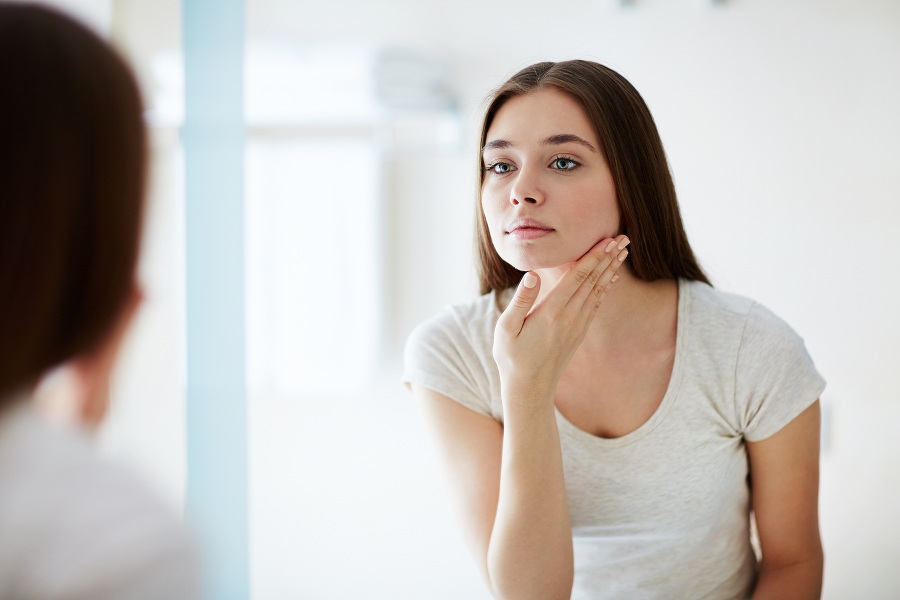Even those who are clued up on the latest skincare ingredients haven’t heard of it before.
It’s a cutting-edge compound that’s being increasingly added to anti-aging formulas. However, unlike many of the other anti-aging ingredients out there, this one doesn’t target fine lines and wrinkles.
Instead, arbutin focuses on those dreaded age spots. It promises to lighten and brighten, which leaves your complexion looking more balanced and even.
Wondering if it would be worth adding arbutin to your skincare routine? Read on to find out.
Contents
What is Arbutin?

Arbutin is a derivative of hydroquinone, which is a popular skin-lightening agent.
Although arbutin may not be quite as powerful, it also lacks the damaging side effects that hydroquinone is known for.
Some forms of arbutin are natural.
They are derived from certain fruit sources, including the bearberry plant, the blueberry, and the cranberry.
However, arbutin can also be synthetically-produced. While extracting the ingredient from a bearberry plant may be more natural, it’s easier to keep a synthetic version stable.
Alpha Arbutin vs Beta Arbutin
There are two main types of arbutin out there; alpha arbutin and beta arbutin.
Alpha arbutin is the purest and most potent form of the compound. This also means that it is more expensive to produce, therefore bumping up the price of any skincare product it’s used in.
Beta arbutin is much cheaper to manufacture. Although it’s still effective, results aren’t quite as impressive as when compared to alpha arbutin – research shows that alpha arbutin is up to 10 times stronger.
How do you know which type is being used in a certain skincare product?
This is actually quite easy. If a brand is making use of alpha arbutin, then this will usually be printed on their ingredients list. After all, it only makes sense that the company would want its customers to know that they’re using a superior ingredient in their serum or cream.
However, if the ingredients list simply states “arbutin”, without any additional words that refer to its type, then chances are that beta arbutin is the form being used in that product.
What Does Arbutin Do to the Skin?
Each time your skin comes into contact with the sun, an enzyme in your skin called tyrosinase is activated. This then stimulates your skin into producing more melanin, which is the pigment that gives your skin its color.
Over-exposure to the sun leads to excess melanin production. All of this extra melanin ends up clustering together under certain parts of your skin, leading to those areas taking on a darker color.
Although dark spots can appear at any age, cumulative sun damage is usually what causes them to show up, which is why they’re considered to be a symptom of skin aging.

Arbutin counters age spots from forming by blocking the tyrosinase enzyme from being activated whenever you’re in the sun. As a result, this prevents the skin from producing excess melanin, which then means that age spots cannot form.
Since your skin is now producing less melanin, this also has an overall lightening effect on the rest of your complexion too.
Benefits of Alpha Arbutin for Skin
The many benefits of arbutin make it easy to see why this ingredient has become a must-have:
Fades Dark Spots to Even Out the Skin Tone
The main benefit of arbutin for skin is the way in which it’s so effective at fading dark spots.
Although not technically harmful in themselves, dark spots lead to an uneven skin tone. They make the skin look older and duller, detracting from that balanced, youthful glow you once had.
When compared to the other skin lightening products out there, arbutin comes out on top. It’s much safer than hydroquinone, but also much more effective than many of the other alternatives. It’s often available as a serum too, which your skin will readily drink up.
Brightens the Skin
The lightening effect that arbutin has on the skin will quickly give your complexion a brighter and more radiant look.
The way in which this agent inhibits melanin production will keep your skin tone light and bright.
The reduction in dark spots also contributes to the ingredient’s brightening effect – a clearer and more balanced complexion will always look more luminescent than one that’s dotted with patches of hyperpigmentation.
Lightens and Fades Scars
There aren’t many topical products out there that are truly effective at eliminating acne scars.
The reason for this is because they don’t penetrate deep enough into the skin. They may help to a certain extent, but most people dealing with severe scarring turn to cosmetic medicine, opting for chemical peels or laser treatments instead.
If that’s a route that you’ve been considering, hold off until you’ve given arbutin products a try for a few months.
It offers a non-surgical way of fading acne scars, especially if combined with a menu of other proven scar-lightening ingredients, such as niacinamide, vitamin C, retinol, a hyaluronic acid serum, and, of course, sunscreen.

Gentle Enough for All Skin Types
Unlike hydroquinone products, which can severely irritate dry or sensitive skin, arbutin can be safely used on all skin types.
How to Use Arbutin
As more and more studies, each by a credible author, confirm the benefits that arbutin brings to the skin, the ingredient is being increasingly used in skincare products.
You’ll find the compound in everything from serums to moisturizers to face masks, giving you plenty of choices when it comes to incorporating arbutin into your skincare routine.
Don’t forget to also double check which form of arbutin is being used in any new products you’re considering purchasing. The reason for this is because, ideally, you want a formula that contains alpha arbutin, rather than beta arbutin.
The Ordinary Alpha Arbutin 2 HA
Of course, just because a product contains arbutin doesn’t mean that it will work – the concentration of arbutin used matters too.
If you’re going with alpha arbutin, look for something between 1-2%, such as The Ordinary Alpha Arbutin 2 HA serum. You’ll also find alpha arbutin in Peter Thomas Roth products.
If beta arbutin is all you can find, then you can go for a serum or moisturizer concentration of up to 7%.
Recommendations from Y Claire Chang
A board-certified dermatologist who is championing the growing popularity of alpha arbutin, Y Claire Chang recommends using the ingredient twice a day. It works just as well during the day as it does at night, so try to incorporate it into both your am and pm skincare routine.
Always apply alpha arbutin to clean and dry skin, and try combining it with other brightening ingredients, such as vitamin c, retinol or retinoids, and hyaluronic acid, for maximum benefits.
Sunscreen is also essential – since your skin won’t be producing its protective pigment any more, you’ll need to take sun protection into your own hands.

How Long Does Arbutin Take to Work?
The effects of arbutin aren’t instant.
The ingredient needs to trigger changes in the deeper layers of your skin, meaning that it could take one to two months before you start to notice a difference. Everything from your skin type to the other skincare products that you’re using will also impact this.
Those with darker skin tones will also need to wait a little longer before they see results. Dark skin naturally contains more melanin, so it will take the ingredient more time to get things balanced out.
Using the ingredient consistently in your skin care routine makes a huge difference to how arbutin works. Its effects at blocking melanin production aren’t permanent, so any arbutin products that you use should be applied regularly.
Stop using them and the tyrosinase enzyme in your skin will reactivate after a few weeks, meaning that your skin will once again be susceptible to dark spots.
Side Effects of Arbutin
Hydroquinone is known for its harmful side effects, leading many to believe that arbutin is the same. After all, arbutin comes from hydroquinone.
However, arbutin is revered for being a much safer alternative. Hydroquinone works by killing off the cells in the skin that produce melanin. As you can imagine, such an irreversible action can have its consequences.
On the other hand, arbutin only temporarily inhibits those cells from producing their pigment. Although this means that the skin lightening effects of arbutin aren’t permanent, it also means that you won’t have to deal with any side effects.
The main issue worth taking note of is allergic reactions. If you have never used arbutin before, start by doing a patch test to ensure that your skin is compatible with the ingredient. If you experience any redness or irritation, you may be best off looking for alternative skin brighteners.
One other thing to keep in mind is that you shouldn’t use arbutin for more than three months. If you’re still dealing with dark spots and scars after this time, take a break for a while and switch over to other brightening skincare products, before returning to arbutin again in the future.

FAQs
Does arbutin whiten skin?
Arbutin doesn’t actually change the natural color of your skin. It simply tackles any extra darkness that your skin has taken on because of UV light exposure.
It’s effective at lightening the dark spots and hyperpigmentation that wouldn’t have been there if it weren’t for sun damage, but it won’t whiten your skin any more than this.
Does arbutin turn into hydroquinone?
Technically, if kept at alkaline conditions, then yes, arbutin would slowly convert into hydroquinone.
However, the skin isn’t alkaline – it’s actually slightly acidic. This means that, so long as the product formula remains at a neutral or acidic pH level, then you don’t need to worry about arbutin turning into hydroquinone after it has been applied to your skin.
Can arbutin and vitamin C be used together?
Yes, not only is it safe for alpha arbutin and vitamin C to be used together, but the two actually complement each other very well.
Both work in similar ways when it comes to lightening and brightening the skin, so using vitamin C and alpha arbutin together would give you the results you’re seeking much faster.
It is also perfectly safe to add vitamin A, also known as retinol, into the mix, with a serum being the best form. However, be careful when using vitamins A and C in the AM, as they can make your skin more sensitive to the sun.
Conclusion
Whether you’re dealing with existing areas of hyperpigmentation or you’re concerned about dark spots appearing at a later stage in your life, arbutin is an ingredient that needs to be on your radar.
It’s a much safer alternative to most of the other skin-brightening ingredients available and is one that is readily accepted by all skin types.
After reading this, you may be tempted to start slathering an alpha arbutin serum all over your skin but have some restraint.
Arbutin is exceptionally powerful, so start off slow but remain consistent. Give your skin some time to adjust to the ingredient, so that it can spend the next few months making the most of all of the potential that arbutin holds.